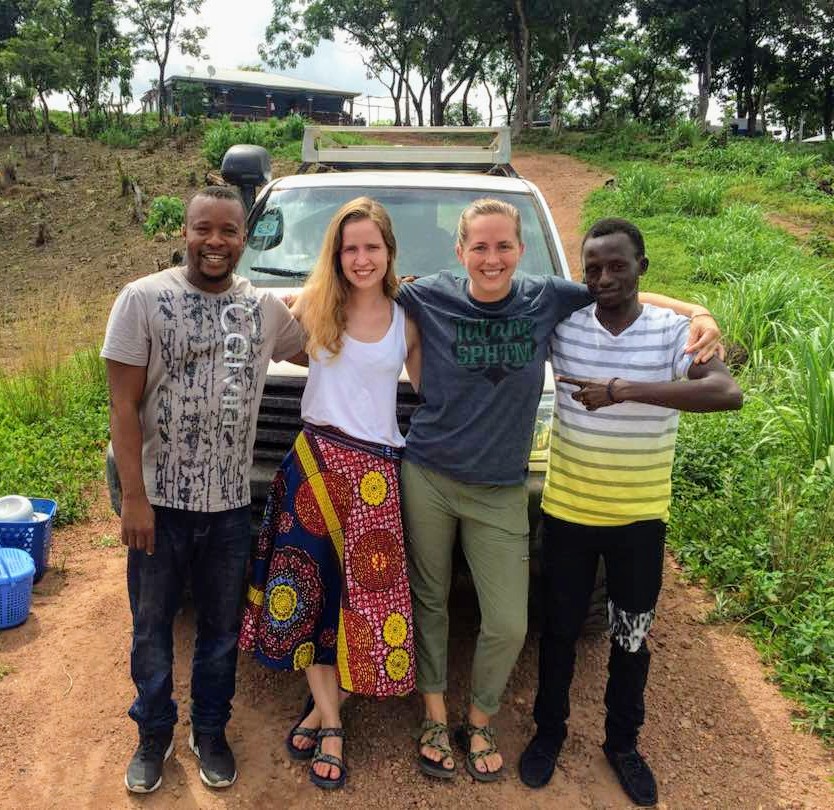Changemaker Catalyst Award recipient Jenna Bates spent the past summer in Sierra Leone completing a needs assessment for Ebola Survivor Corps (ESC). Jenna is a senior at Tulane University, majoring in Neuroscience with a minor in Public Health.
 Ebola is a household name to many people, bringing to mind the 2014-2016 outbreak in West Africa that received widespread international news coverage. There were over 28,000 cases, affecting rural and urban areas in countries with limited healthcare access. It was the largest outbreak of Ebola that had ever been described, and the grave mortality rate of over 50% sent much of the world into a panic. Well after the news coverage has halted and foreign aid organizations have pulled out, Ebola survivors face challenges as they struggle to maintain their livelihoods. Former studies have shown that many survivors suffer from Ebola-related disabilities such as fatigue, headaches, and eye problems. In addition, there is concern that survivors have higher rates of depression, anxiety, and post-traumatic stress disorder. The household-based spread of Ebola meant that survivors often had family members and friends that did not survive. In addition, the crippling fear of other community members led to the stigmatization of survivors in many cases, making the reintegration process challenging. Many foreign aid organizations offered assistance to Ebola survivors directly after the outbreak. However, now that three years have passed since the end of the epidemic, the vast majority of supporters have pulled out of the country.
Ebola is a household name to many people, bringing to mind the 2014-2016 outbreak in West Africa that received widespread international news coverage. There were over 28,000 cases, affecting rural and urban areas in countries with limited healthcare access. It was the largest outbreak of Ebola that had ever been described, and the grave mortality rate of over 50% sent much of the world into a panic. Well after the news coverage has halted and foreign aid organizations have pulled out, Ebola survivors face challenges as they struggle to maintain their livelihoods. Former studies have shown that many survivors suffer from Ebola-related disabilities such as fatigue, headaches, and eye problems. In addition, there is concern that survivors have higher rates of depression, anxiety, and post-traumatic stress disorder. The household-based spread of Ebola meant that survivors often had family members and friends that did not survive. In addition, the crippling fear of other community members led to the stigmatization of survivors in many cases, making the reintegration process challenging. Many foreign aid organizations offered assistance to Ebola survivors directly after the outbreak. However, now that three years have passed since the end of the epidemic, the vast majority of supporters have pulled out of the country.
Ebola Survivor Corps is a non-governmental organization that has worked to create an ongoing partnership with survivors in Koinadugu District, Sierra Leone. In response to the ongoing outbreak, ESC recognized that Ebola survivors could disseminate messages throughout the community with relatively low risk due to their acquired immunity. They trained five Survivor Health Advocates (SHAs) to go door-to-door and deliver relevant health information to community members. In doing so, they became trusted leaders of the community and simultaneously battled the stigma that faced many survivors. They continued their health messaging past the end of the epidemic, focusing on a variety of diseases such as meningitis, cholera, and malaria. Three years after the epidemic, Ebola Survivor Corps needed to evaluate their role and envision the future of the program. My job was to help with the assessment by assisting with interviews, surveys, and focus groups to identify the needs of the target population.
 As much as I had read about Ebola and its long-term effects, there was nothing that could compare to speaking to survivors themselves. I met a group of people that was vibrant, enthusiastic, and acutely aware of their needs. They were open about their difficult experiences as they described their statuses as Ebola survivors and the complications of dealing with post-Ebola disability in an agriculturally based economy. They had incredible ideas for programs that could improve their wellbeing. They wanted help opening a clinic in one of the more remote villages in the district, where individuals had to travel for hours to obtain basic healthcare. They asked for help obtaining the materials to build wells so they could have access to drinking water. It is easy to enter another country with preconceived notions about the needs of a population, but I learned far more from listening to people and hearing them talk about the changes that they wanted to make in the communities around them. It was an incredible experience that completely changed my understanding of international health, and I know that it will impact my career going forward.
As much as I had read about Ebola and its long-term effects, there was nothing that could compare to speaking to survivors themselves. I met a group of people that was vibrant, enthusiastic, and acutely aware of their needs. They were open about their difficult experiences as they described their statuses as Ebola survivors and the complications of dealing with post-Ebola disability in an agriculturally based economy. They had incredible ideas for programs that could improve their wellbeing. They wanted help opening a clinic in one of the more remote villages in the district, where individuals had to travel for hours to obtain basic healthcare. They asked for help obtaining the materials to build wells so they could have access to drinking water. It is easy to enter another country with preconceived notions about the needs of a population, but I learned far more from listening to people and hearing them talk about the changes that they wanted to make in the communities around them. It was an incredible experience that completely changed my understanding of international health, and I know that it will impact my career going forward.
